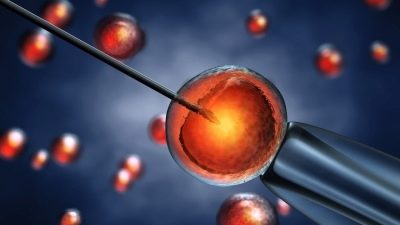Norma AMG for IVF. The likelihood of pregnancy with low levels and ways to increase the anti-Muller hormone
The impossibility of self-conceiving a baby is often associated with hormonal disorders in a woman. Among the great diversity of endocrine disorders separately stands the lack of AMG. The level of this hormone is extremely important for the reproductive function of both men and women, but here it “works” among representatives of different sexes in different ways.
Before IVF analysis on AMG is required. What should be the norms of the Muller inhibitor, can you get pregnant in the IVF protocol with a low level of this substance and how to increase the concentration of AMH, we will tell in this article.
What it is?
AMH (antimulers hormone) was discovered as early as the 19th century, when protein molecules that affect growth processes in the organs of the reproductive system were discovered by German naturalist and biologist Johann Muller. He found that embryos, regardless of gender, have a common feature - a tube-canal, from which, at about 9 weeks of gestation, male embryos form testicular appendages under the influence of AMH. This is the sexual delimitation.
In female embryos, AMH is not produced and, by default, a canal tube begins to form into the fallopian tubes, ovaries. In girls, AMH begins to be produced only after birth.
The function of the Müller inhibitor is to ensure human sexual function throughout life. In women, the AMH level indicates the functioning of the ovaries, the maturation of the egg. The Müller inhibitor regulates follicle growth and decreases with age. The amount of AMH in the blood plasma of a woman is a fairly accurate indicator of the ovarian reserve; it can indicate the approximate number of eggs that remain “in stock”.
Before puberty in girls, AMH is determined in extremely low concentrations. With the onset of puberty, the level of the Müller inhibitor begins to increase, and then gradually decreases over the course of life. During menopause, AMH is not detected in the blood plasma.
AMG norms for IVF
As already mentioned, the concentration of the inhibitor Muller in the blood plasma is directly proportional to age. Therefore, the norms depend on how old the patient was at the time of planning the in vitro fertilization protocol. The rate for women under 35 is 4.0–6.5 ng / ml. The level of AMH is considered to be slightly impaired at rates of 2.5-4.0 ng / ml. Reduced is the indicator of 0.3-2.2 ng / mg. A concentration of less than 0.3 ng / ml is considered low.
In women older than 35 years, the rate is different. The normal level is 1.5-4.0 ng / ml. A conventionally normal indicator is 1.0-1.3 ng / ml. The low level is 0.5-1.0 ng / ml, and a critical decrease is considered to be less than 0.5 ng / ml.
These standard values are typical for women, the cause of infertility which lies not in hormonal disorders, but, for example, in obstruction of the fallopian tubes or the thinning of the endometrium. But in most cases, women with endocrine disorders or concomitant endocrine problems have to resort to IVF, and therefore a value of 0.6–0.8 ng / ml is established as the minimum standard value of AMH for IVF.
On average, in vitro fertilization requires that the concentration of AMH is from 0.6 ng / ml to 2.4 ng / ml.
Women who have taken oral contraceptives for a long time before planning their pregnancy most often suffer from low levels of anti-Muller hormone, since such drugs suppress the production of AMH and lead to premature climax.
Deviations from norms and prognosis for pregnancy
High levels of AMH before the IVF procedure should alert the attending physician. Patients in whom the concentration of the Müller inhibitor is increased to 6.5-7 ng / ml are more likely to have ovarian hyperstimulation syndrome, a dangerous complication of the first stage of in vitro fertilization. High levels of the hormone slows down or completely blocks the growth of follicles, respectively, to get the right amount of eggs for in vitro fertilization will not be easy.
With a low level of anti-Muller hormone, the likelihood of pregnancy is reduced, since few follicles are formed. With laboratory indicators below the norm at the planning stage of the protocol, the doctor may assume that the ovarian response to hormonal stimulation of superovulation will be weak.
A low AMH level reduces the likelihood of pregnancy even when IVF is performed with ICSI, when a sperm cell is injected under the oocyte membrane with a thin cannula. Reduced hormone levels indicate poor quality of the eggs, and therefore, even with pregnancy, as a result of the IVF protocol, the probability of miscarriage or missed abortion in the early stages will be high.
Indicators of hormone concentration must be taken into account when choosing the nature of the protocol. If in the blood plasma of a woman AMH is below 0.71 ng / ml, stimulation is carried out with high doses of antagonists in combination with FSH. If the hormone concentration in a woman’s blood is above 0.71 ng / ml, but does not exceed 2.1 ng / ml, then a long protocol is usually prescribed in which hormones are first used to suppress ovulation and cause artificial menopause, and then follicle-stimulating hormones .
The probability of conception with a successful IVF and elevated AMH level is higher than with a reduced concentration. The more reduced the values, the harder it is for a woman to get pregnant, even after embryo grafting. In general, the probability of success of IVF protocol in Russian clinics is estimated at 35-45%. With a significant decrease in AMH, the predicted probability of a successful pregnancy does not exceed 25-30%. There is a chance for pregnancy if the woman has no other associated pathologies of the uterus, cervix, or endometrium.
A low level of AMG in the natural cycle does not exclude the possibility of becoming pregnant, but makes it even less likely. Without appropriate pre-treatment IVF in the natural cycle, with such indicators try not to carry out.
It is always important to establish the true reason for the decline of the Müller inhibitor so that a woman can undergo targeted treatment of pathology before any IVF protocol.
How to pass the analysis?
For the study used a sample of venous blood of a woman. In the direction of a gynecologist, fertility specialist or endocrinologist, a woman should contact the laboratory for 3-5 days of the menstrual cycle. It is during this period that the AMG indicator is the most adequate.
The AMH level is extremely unstable, and therefore it is necessary to prepare for a blood test in advance - to reduce physical exertion a week before visiting the clinic, get enough sleep at night, to prevent deterioration of health. Any diseases carried over the last 2-3 weeks, as well as taking antibiotics or anticonvulsants can lead to a distortion of the test result.
The stress and emotional turmoil that a woman experiences leads to fluctuations in the level of anti-Muller hormone. For 10-12 hours you should avoid meals, for 3 hours - do not drink water.A few hours before donating blood, it is advisable not to smoke or drink strong tea or coffee.
On average, the result of the analysis becomes known after 48 hours. In some laboratories for the study takes about a day.
Is it possible to increase the AMG?
Since the concentration of the Müller inhibitor is unstable, it can change — it increases and decreases depending on many factors. For example, in summer and spring, the hormone level in a woman’s body rises by about 15-18%. Therefore, it is often associated with vitamin D, which is produced when human skin comes into contact with sunlight.
DHEA (dehydroepiandrosterone) therapy is considered effective. Such hormonal treatment is prescribed at a very low level of AMH for 3-4 months before IVF. In most cases, in combination with vitamin D, hormonal treatment gives a positive result, and tests for AMH before the IVF protocol show a higher level of anti-Muller hormone.
Sometimes doctors recommend that women take the anti-menopausal drug Melsmon. It is produced in Japan based on placental cells. Like any other tool from the range of placenta, the drug has its advantages and disadvantages, but often the effect of its reception is greatly exaggerated by the manufacturers.
A woman with a reduced level of Müller inhibitor is recommended to lead an exceptionally healthy lifestyle. A noticeable growth of the hormone is observed if sugar and baking are completely eliminated from the diet. AMG is also increasing as a result of weight loss.
If a woman has problems with fat metabolism, then first she needs to consult with an endocrinologist - he will help create a diet of therapeutic nutrition to improve lipid metabolism. Reducing weight by 5 kilograms increases the likelihood of pregnancy by about 4%, and if a woman adjusts her weight to a normal body mass index for her age, the AMG level rises to a level that is sufficient for IVF to be more likely to succeed. Getting rid of excess weight increases the chances of pregnancy by about 10%.
Coffee, strong tea and other foods and beverages that contribute to high blood pressure are destructive of the follicles and significantly lower AMH. Therefore, in the fight for the right to become a mother, it is important to abandon such drinks.
A woman should stop smoking - in this case, the level of anti-Muller hormone rises by about 25% after a couple of months after giving up the habit, and the chances of conceiving increase by 15%.
To increase the concentration of the hormone, fatty dairy products (2.5% fats and above), as well as vegetables, fruits, meat, fish, will be useful. It is advisable to take vitamins and maintain an active lifestyle. However, excessive physical exertion is better to refuse, replacing the intense workout in the gym for swimming, easy running, cycling.
Reviews
According to women, some clinics refuse to carry out the procedure of in vitro fertilization with extremely low levels of the anti-Muller hormone. This problem is especially acute for women who plan to do IVF on a quota. These women have special requirements, and if AMH is less than 1.0 ng / ml, then doctors are legally entitled to refuse to carry out the procedure. However, on a paid basis and lower rates of AMH are not grounds for refusal.
The IVF procedure is always stressful for a woman, and therefore patients often describe that AMH, which before the start of the protocol was completely acceptable, fell sharply in the middle of the protocol. Regarding the success of the procedure, women note that with AMH below 1.0 quite often, physicians manage to get up to 15 oocytes, with AMH below 0.5 - 7-9 eggs. This means that the probability of getting pregnant exists, and it is quite real.
On the question of whether it is worth going to IVF with low AMG, which women who are planning to become pregnant often ask on the Internet, only the attending physician can answer, because, in addition to AMG, concentrations of other hormones are important, as well as general health.
All about the anti-Muller hormone (AMG): when, why, and how to take it, see the next video.






















